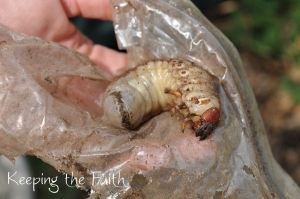I have joined Hip Mountain Mama’s One Small Change challenge for 2010. The challenge is to make one change each month leading up to Earth Day, April 22. It can be small or it can be huge, something I will do to make a positive green impact and follow through with it.
This month is – COMPOST! Admittedly, my compost pile is decades old, because I’ve been composting forEVer, but hey! It’s a small change that is doable for everyone.
Composting is the transformation of plant matter through decomposition into a soil-like material called compost. Insects and earthworms, and microorganisms such as bacteria and fungi help in transforming the material into compost. Composting is a natural form of recycling – and a prime example of Lavoisier’s principle of the conservation of mass – it is never lost or gained, only rearranged. Now that I think of it, it also aptly demonstrates the first law of thermodynamics – Energy is never lost or gained, it just changes form.
I digress, and my geekness is showing. Why is composting so important? To start, yard and food wastes make up approximately 30% of the waste stream in the United States. Composting could reduce the amount of municipal solid waste by almost one fourth. The standard means of disposal for most yard and food waste are landfilling and incineration. These practices are not as environmentally or economically sound as composting. Yard waste which is landfilled breaks down very slowly due to the lack of oxygen and it produces methane gas and acidic leachate, both which cause other environmental problems. Landfilling organic wastes also takes up space needed for other wastes that needs to be in a landfilled. Incinerating moist organic waste is inefficient. It results in poor combustion, which disrupts the energy generation of the facility and increases more pollutants that need to be removed by the pollution-control devices.
Composting is a more effective and less expensive means of managing organic waste, and it provides a nutrient-rich soil amendment! Compost added to gardens improves soil structure, texture, aeration, and water retention. When mixed with compost, clay soils are lightened, and sandy soils retain water better. Mixing compost with soil also contributes to erosion control, soil fertility, proper pH balance, and healthy root development in plants.
You can compost all of your kitchen waste – everything except meat and dairy products. When combined with complete recycling of plastics, paper and glass, you are left with very little garbage from your household that heads to the landfill! For more information on how to get started, visit Compost Instructions for a complete list of resources and simple instructions.
Composting is not without some inherent danger, however. Remember that part a few paragraphs back about “insects” breaking down the organic matter? There are some creepy critters who like to take up residence and overwinter in our compost bin – like this ‘little’ guy. He’s a stag beetle larvae. I found him when spreading compost this past weekend. I put him gently back in the bottom of the bin when I was done, so he can finish mutating into an fierce warrior beetle.
Yes..that’s a plastic sandwich bag that was in the compost bin. Shame on us. It was handy for holding up His Royal Grossness for the camera, though!


